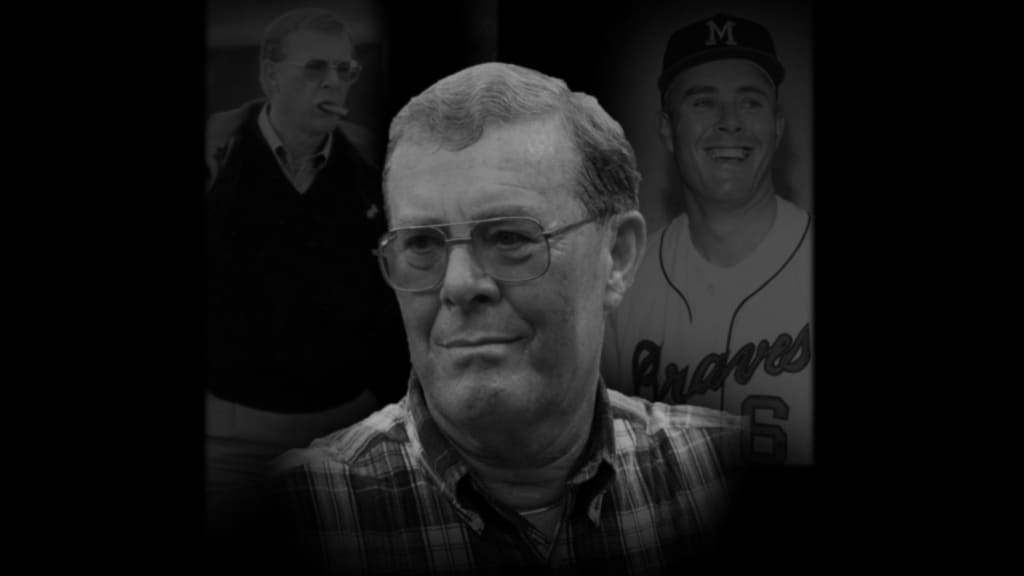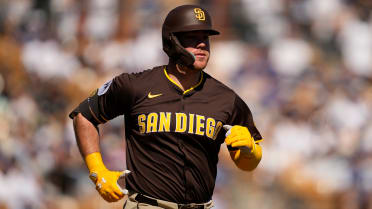
ATLANTA -- Paul Snyder had an endless supply of great baseball stories. One of his favorites involved him unsuspiciously sitting in his car alongside a field at the Tigers’ Spring Training complex in 1990.
Per the advice of Hep Cronin, one of his top scouts, Snyder was trying to learn more about a young high school shortstop named Chipper Jones. Before heading to Jacksonville to see the future Hall of Famer play at The Bolles School, Snyder opted to spy on a private workout the Tigers were conducting in Lakeland, Fla.
“They say if you can’t see, you can scout if you can hear,” Snyder said. “We sat in the car and listened for the wood bat to ring.”
Around this same time, Snyder had gone to Puerto Rico to see a young catcher named Javy Lopez. Not wanting the Yankees or any other club to know he was there, he hid under the stands. The view was fine. But a nail protruding from one of the wood benches ripped a shirt his beloved wife Petie had recently bought him.
These were just a couple of the treasured stories told by one of the most beloved and influential figures in Braves history. Snyder’s impact on the organization was highlighted again on Friday, as many former Atlanta players and executives learned he had passed away Thursday night at the age of 88.
“I’ve always said I was raised by Hall of Famers and [Snyder] was one of them,” manager Brian Snitker said. “It was always about the person and about your family. He’s the one who embodied the ‘Braves Way.’ He helped create that.”
When Snyder joined the then-Class D Midland Braves as a lanky first baseman in 1958, nobody knew it was the beginning of what would become a celebrated 50-plus year stretch that included him being inducted into the Braves Hall of Fame in 2005. He was elected to the Professional Baseball Scouts Hall of Fame in 2013.
Snyder became a Minor League manager after never reaching the Majors, and he moved into the front office in 1973. He and Bill Lucas formed a strong bond before the latter became MLB’s first Black general manager (though Ted Turner never gave him the actual title) near the end of the 1976 season. Snyder served as one of Turner’s top lieutenants and truly flourished while working as Bobby Cox’s scouting director after Cox became Atlanta’s GM after the 1985 season.
This was around the same time current Dodgers president and CEO Stan Kasten began his long tenure as the Braves’ president.
“Someone very close to the organization said, ‘You need to get rid of Paul Snyder because that is where the breakdown is,’” Kasten said. “I said, ‘OK, thanks. I’ll make my own decision, but I appreciate that.’ He was in an administrative role and that’s not where he should have been. Bobby and I felt strongly about this. So we let him return to being a scout, supervisor and crosschecker. Let me tell you, that decision made a big difference for the next decade or more. He’s an unsung hero.”
Kent Mercker, Steve Avery, Ryan Klesko and Chipper Jones were among the future stars drafted over the next few years. Snyder had also targeted a young Tom Glavine a year before Cox returned to Atlanta. And he oversaw the signings of Lopez, Andruw Jones and other international players who would influence Atlanta’s great success during the 1990s.
When John Schuerholz came to Atlanta to become the Braves’ GM after the 1990 season, he put Chuck LaMar in charge of his scouting and player development departments. Snyder became a special assistant. The title was fine, but his role was a demotion as he was now essentially the northeast scouting supervisor.
Multiple teams called and asked for permission to talk to Snyder. But as friends around the league told him how he had been wronged, he stayed loyal to the Braves and became the club’s scouting director again in 1997 when LaMar became the Rays’ GM.
Snyder’s actions were mirrored a couple of decades later, when an enraged Snitker opted to stay loyal to the Braves organization after being demoted from Atlanta’s third base coach to Triple-A Gwinnett’s manager after the 2013 season.
Both placed their pride aside to remain a part of the Braves during their long, distinguished baseball careers.
“[Snyder] was just a special, special man,” Snitker said. “He’s kind of like Dale Murphy. People used to ask me if Murph was as good as he seems. I would say, ‘No, he’s even better than that.’ If you interview everybody in baseball, I don’t think you’ll ever hear anybody say a cross word about Paul Snyder.”
Rangers senior advisor Dayton Moore stands as one of the many proud disciples of Schuerholz and Snyder. The latter brought him into Atlanta’s front office in 1996 and mentored him until Moore became the Royals’ GM during the 2006 season.
As Kansas City competed in the 2014 World Series, Moore made sure to have the Snyders (Paul and Petie) with him.
“I told him I wanted him there because we reached that point because of the examples he set along the way,” Moore said. “Nobody I’ve ever met was willing to disadvantage himself to help others as much as he did. That’s what great leaders do, and everybody wanted to be around Paul Snyder.”
It was Snyder who had the many conversations that led the Braves to turn away from Todd Van Poppel and sign Chipper Jones. It was Snyder who oversaw the collection of talent that helped the Braves win 14 consecutive division titles. The last of those division crowns in 2005 with the help of a rookie named Jeff Francoeur.
When the Braves took Francoeur with their first-round pick in 2002, then-assistant GM Frank Wren offered him a $2 million signing bonus. Wren made the same offer a few weeks later. When this didn’t lead to a signing, Snyder and Moore visited Francoeur’s home in Gwinnett County.
“Paul knew what had happened,” Francoeur said. “He asked my dad to step outside and he said, ‘You only have one chance with your kid. You make sure you get what you want and get it your way.’ A couple weeks later, Schuerholz called and said, ‘Why have you not signed?’ I told him the story of Frank Wren and he said, ‘How does $2.2 million sound?’ I was playing in Danville the next night.”
Whether it was Murphy, Bruce Benedict, Glavine, both of the Joneses or Francoeur, Snyder had an impact on their Braves career. His advice led Atlanta to overlook a funky delivery and draft Alex Wood in 2013, 55 years after Snyder had first joined the organization as a player.
“Everybody you cared about, you wanted them to meet Paul Snyder,” Moore said. “He made you feel proud about who you were and what you were about.”
Supervising Club Reporter Mark Bowman has covered the Braves for MLB.com since 2001.




